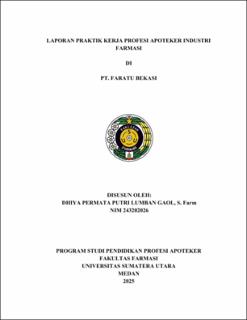| dc.description.abstract | Background: The pharmaceutical industry is a business entity that has permission
from the government to conduct activities related to the production of medicines or
medicinal materials based on research and development. To ensure that the products
produced are safe, effective, and of high quality, the government has established
Good Manufacturing Practices (CPOB) as a mandatory guideline to be implemented
and followed. CPOB covers aspects such as quality systems, personnel, buildings
and facilities, equipment, production, quality control, and distribution. The
implementation of CPOB not only guarantees the quality of medicines but also
protects patients from the risks of unsafe, ineffective, or low-quality medicines. Its
implementation requires the involvement of pharmacists as professional personnel
responsible for quality assurance, process validation, production supervision, and
documentation in accordance with applicable regulatory standards.
Purpose: This Professional Practice Training (PKPA) is conducted with the aim of
preparing future pharmacists to understand the role, functions, and responsibilities of
pharmacists as pharmacists. in the pharmaceutical industry, as well as for prospective
pharmacists to gain sufficient insight, knowledge, and practical experience about
pharmaceutical work in the industry through the implementation of Good
Manufacturing Practices (CPOB).
Summary: The PKPA activities at PT. Faratu include activities in the product
quality control section to ensure that the products produced meet applicable
standards by conducting laboratory tests on the produced products and recording the
test results.
Conclusion: Based on the experience during the PKPA, prospective pharmacists
gained direct practical experience in the implementation of CPOB. Through this
activity, participants not only acquired theoretical understanding but also practical
experience regarding the roles and responsibilities of pharmacists in ensuring the
quality, safety, and efficacy of drugs. Thus, the PKPA serves as an important
foundation for prospective pharmacists to enhance their competencies, skills, and
readiness to face professional challenges in the pharmaceutical industry. | en_US |


